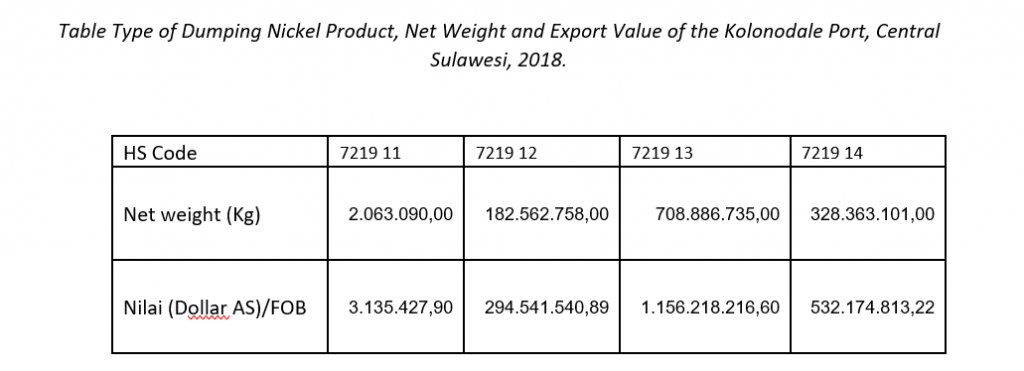On Anti Dumping Costs for Nickel Products Export to the European Union
Stop the Inexpensive Nickel Product Policy, Improve Labor Welfare, Stop Using Coal Power Plants, and Cancel Plans to Dispose Waste Into the Sea
Press Release, June 3, 2020
Perkumpulan Aksi Ekologi & Emansipasi Rakyat (AEER), Jatam Central Sulawesi, Yayasan Tanah Merdeka
.The cheap prices of processed nickel ore products produced in Indonesia are inseparable from cheap labor costs and incomplete environmental standards from the beginning to the post-mining period. Nickel products produced from Indonesia in the form of hot rolled stainless steel sheets and coils (SSHR) are cheaper on the international market. This triggers the European Union to impose anti-dumping fees on nickel products from Indonesia.

The cheap prices of processed nickel ore products produced in Indonesia are inseparable from cheap labor costs and incomplete environmental standards from the beginning to the post-mining period. Nickel products produced from Indonesia in the form of hot rolled stainless steel sheets and coils (SSHR) are cheaper on the international market. This triggers the European Union to impose anti-dumping fees on nickel products from Indonesia.
The European Union is examining the possibility of dumping two nickel products from Indonesia. That is PT Indonesia Tsingshan Stainless Steel, Jakarta (‘ITSS’), PT Indonesia Guang Ching Nickel and Stainless Steel Industry, Jakarta (‘GCNS’).
PT. CGNS has a production capacity of 600,000 per year, buying semi-finished nickel products from supplier companies located at PT IMIP, consuming 6 million tons of nickel ore at 1,9%. The fuel needed for drying and burning nickel ore is coal powder, with a quantity of lignite of 480,000 tons per year.
PT Indonesia Tsingshan Stainless Steel (ITSS) with a stainless steel production capacity of 1 million tons per year and 1 rolling production line with a production capacity of 2 million tons per year, buys supplies from companies located at IMIP.
In the decision of the European Union Commission on 7 April 2020, applying an anti-dumping levy of 17% for the two companies products is valid for the next six months for several types (HS code).
Based on Foreign
Trade Statistics of Central Sulawesi Province in 2018, there are 4 types of
nickel products with the same HS code subject to anti-dumping fees.

If production remains the same as in 2018, with an estimated 3% export to the European market from the Port of Kolonodale, Central Sulawesi, then the total levied from anti-dumping costs in 6 months is USD 5.064.478,50 or equal to IDR 73.434.938.198,60 (with an exchange rate of 1 USD = IDR 14,500).
This amount is very large compared to some types of expenditure of the Central Sulawesi Provincial Government. For example Capital Expenditures for Equipment and Machines – Procurement of Teaching Aids / School Practices in 2019 amounting to IDR 64.475.000.000,00, or Capital Expenditures for Buildings – Procurement of Health Buildings in the amount of IDR 32.007.311.133,00. The cost of dumping is equivalent to raising the annual salary of 10.000 workers in Morowali by 17%.

The consequences of anti-dumping certainly have added value which is not enjoyed by laborers, citizens around the mining and local environmental protection and rehabilitation. Workers complain about the long working hours even in the midst of a pandemic.
The target of low export prices is unsustainable, detrimental to the environment, labor, and affected citizens.
The imposition of anti-dumping costs is related to the protection of the industry of the market countries, but this is inseparable from the policy of the nickel industry which suppresses the lowest costs.
This anti-dumping can be avoided by increasing labor costs which will improve the overall local people’s economy, post-mining environmental management, the application of best air pollution technology so that citizen complaints in the form of dust from the nickel industry coal power plant does not occur (will ultimately reduce the health of citizens).
The government is also expected to not implement the disposal of nickel processing waste into the sea for low cost, because cheap nickel products only sacrifice the surrounding residents, laborers, terrestrial and marine biodiversity.